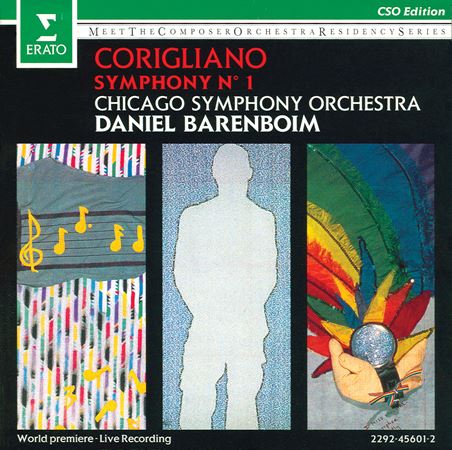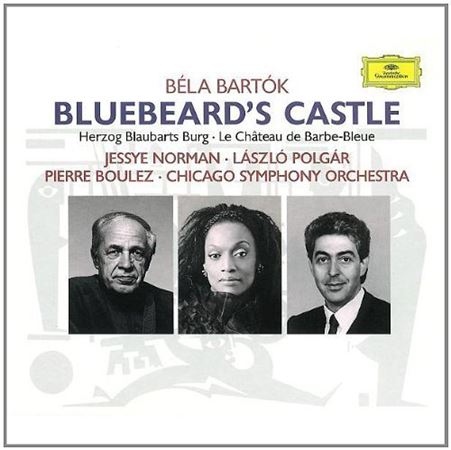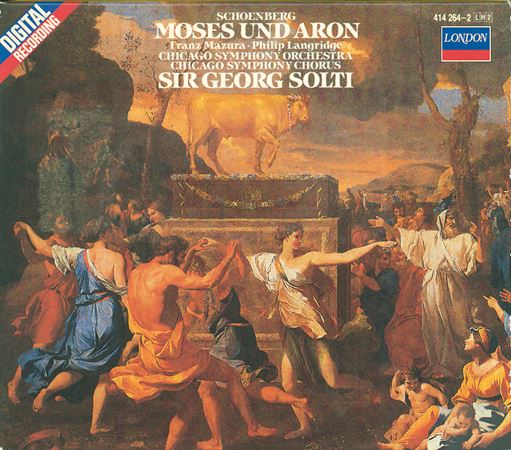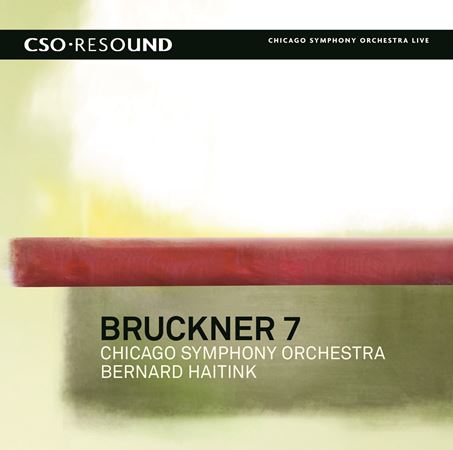Rick Boyum in his usual spot in Orchestra Hall: the house-right aisle of the Fadim Lower Balcony
The Chicago Symphony Orchestra’s commercial recording legacy began on May 1, 1916, when second music director Frederick Stock led the Wedding March from Mendelssohn’s A Midsummer Night’s Dream for the Columbia Graphophone Company. The Orchestra has since amassed an extraordinary, award-winning discography on a number of labels — including Angel, CBS, Deutsche Grammophon, Erato, London/Decca, RCA, Sony, Teldec, Victor and others — continuing with releases on the in-house label CSO Resound under tenth music director Riccardo Muti. For My Favorite CSO, we asked members of the Chicago Symphony family for their favorite recordings (and a few honorable mentions) from the Orchestra’s discography.
A Minnesota native, Rick Boyum earned degrees from Winona State College and Duke University, and for many years he taught biology at Highland Park High School. In 1983, he began working as an usher for Andy Frain Services in a variety of venues, including racetracks, theaters hosting tours of Broadway shows and, his favorite, Orchestra Hall. Boyum is a season ticket holder to the Chicago Cubs and, along with his partner, subscribes to five opera companies and three theater organizations. In his retirement, he has traveled to seven continents and serves as a member of the Governing Council of Advocate Aurora Illinois Masonic Medical Center.
“As an usher, I have an unbelievable opportunity to hear performances by the Chicago Symphony Orchestra. For all of the recordings below, I heard live performances three or four times that led to a commercial recording. I am at a different place in my life each time I hear this memorable music, and so, just as three live performances on three consecutive nights are never exactly the same, the recordings never sound quite the same to me. The observers are a part of the performance, aren’t they!”
CORIGLIANO Symphony No. 1
Recorded in Orchestra Hall in 1990 for Erato
Daniel Barenboim conductor
Stephen Hough piano
John Sharp cello
1991 Grammy awards for Best Orchestral Performance and Best Contemporary Composition
"Before COVID-19, there was the AIDS pandemic, and so many people I knew were dying. Those of us who were living in it didn’t know how to deal with friends who became sick and never got better. We noticed acquaintances who just did not show up at the usual places ever again, and none of us knew what was coming for us next. Everyone quietly knew that this was a deadly illness.
"John Corigliano was the CSO’s first composer-in-residence, and he is a great human being. There was not an usher he did not stop to talk to, and it seemed like he was always around, eager to be a favorite member of the family. Corigliano wrote his First Symphony, and the CSO gave the world premiere. This symphony just needed to be written and heard.
"Yes, the title of the first movement — Of Rage and Remembrance — is correct. It is a work of rage, of remembrance, and the recording is deeply meaningful to me. It is a ’late’ piece, meaning I listen to it late in the afternoon with a cup of tea or late at night with a glass of wine. Names and faces drift in and out of my mind when I am listening, and, for good reasons, I always become very still when I hear Stephen Hough playing the offstage piano."
BARTÓK Bluebeard’s Castle
Recorded in Orchestra Hall in 1993 for Deutsche Grammophon
Pierre Boulez conductor
Jessye Norman soprano
László Polgár bass
Nicholas Simon narrator
1998 Grammy Award for Best Opera Recording
“Pierre Boulez had a gift that enabled him to conduct an orchestra where there was such transparency that you could hear any strand of sound you wanted to listen, even when the whole ensemble was playing. Do you want to hear what the second trumpets are playing? Sure, it is right there, distinct, but still a part of the whole. I had never heard Bluebeard’s Castle live before these nights at Orchestra Hall. This performance led me to a lifetime of seeking out this opera and anything else Bartók wrote, and I have traveled to Seattle and Toronto to hear this opera.
"Jessye Norman and László Polgár are wonderful in their roles. Listeners do not always get to hear the spoken prologue, but it is included in this recording (I am a big fan of ’no cuts’ from compositions). Of course, we all wait to hear the massive sound of the CSO as the seventh and final door is opened. It still just blows me away. Hearing it in Orchestra Hall was incredibly thrilling, and now when I am sure the neighbors are not home, I let it blast from this CD. For some reason, it took five years for Deutsche Grammophon to release the CD after it was recorded in 1993. It was a long wait for me, but, of course, well worth sticking around for it."
SCHOENBERG Moses und Aron
Recorded in Orchestra Hall in 1984 for London
Sir Georg Solti conductor
Franz Mazura speaker
Philip Langridge tenor
Chicago Symphony Chorus
Margaret Hillis director
Glen Ellyn Children’s Chorus
Doreen Rao director
1985 Grammy Award for Best Opera Recording
"I always wondered why audiences sat on their hands, or maybe turned in their tickets or proudly left with a ’harumph’ at intermission when there was a 20th-century piece on the second half of a concert. Without ever hearing music from Schoenberg, or Berg or Webern, these audience members thought they wouldn’t like it.
"When I was a new usher, I wasn’t yet able to say whether I liked contemporary music or not. I was new to intense listening to what the CSO played, and I wondered why Sir Georg would eagerly program Moses und Aron knowing he was not going to get the roaring standing ovation he would get when he conducted his zillionth Beethoven’s Fifth. After I saw the schedule for the 1983–84 season, I bought a used LP of Moses und Aron conducted by Pierre Boulez. I must have listened to it a dozen times . . . sometimes intently and sometimes just playing in the background as I did other things while learning the piece. Then I heard the opera in concert performances by the CSO conducted by Sir Georg. It was music, and I was fascinated by it. The story moved me, and the music didn’t have a wasted note. The opera passed like a click of the fingers. I later heard Daniel Barenboim conduct Moses und Aron in Berlin, and it was terrific to visit the work again. (But I must confess, I have never quite figured out what the Staatsoper production meant.)"
MAHLER Symphony No. 1 in D Major
Recorded in Orchestra Hall in 1990 for EMI
Klaus Tennstedt conductor
"These were performances of white heat, a powerful emotional intensity. It was as if Klaus Tennstedt wanted desperately to tell us that this is what Mahler’s First meant to him. ’Listen now!’ he seemed to say, ’this is what I have come to feel in my life.’
“I remember how the symphony ended as conducted by Tennstedt and played with superhuman brilliance by the CSO. At the finish, there was a wall of sound . . . roars from the audience . . . tears from me. I had just heard a Mahler that I could never forget, and this recording captures the excitement I felt. I never heard Tennstedt conduct again. Many of the great musicians onstage are now living for me only in my memory and on CSO recordings. To listen to this and other CSO recordings is a great way for me to relive these moments of my life. I think the CSO is the great Mahler orchestra of my lifetime.”
BRUCKNER Symphony No. 7 in E Major
Recorded in Orchestra Hall in 2007 for CSO Resound
Bernard Haitink conductor
“I cannot imagine listening to a better Bruckner orchestra than when I am listening to the CSO, and my introduction to the composer came through live performances of his symphonies in Orchestra Hall. The Seventh Symphony, conducted by Bernard Haitink, sums up for me (at least to the moment) what I have learned and loved while listening to Bruckner’s music. Haitink and the Orchestra are so clean, powerful and contemplative in this interpretation, recorded in 2007. Bruckner in this recording continually surprises by how quickly the time goes by. There is nothing that I do not wish to hear, nothing that I want to hurry past. The long and slow snowy landscapes in my mind go on forever. The CSO brass gives me a permanent memory of so many great evenings in Orchestra Hall. Sometimes people mention the pauses Bruckner put in and define them as a moment to sum up, to recharge . . . but to me, the silence is also music.
"It was an experience to have an immersion with Bernard Haitink when he served as principal conductor. Year after year, I listened to what I thought was familiar music, now stripped clean and heard by all of us as if we had new ears and a new mind, experiencing a new piece of music."
A few honorable mentions:
- SHOSTAKOVICH Symphony No. 8 in C Minor, Op. 65 with Sir Georg Solti for London (1989)
- BACH Saint Matthew Passion, BWV 244 with Sir Georg Solti for London (1987)
- VERDI Messa da Requiem with Riccardo Muti for CSO Resound (2009)
MFC-042








